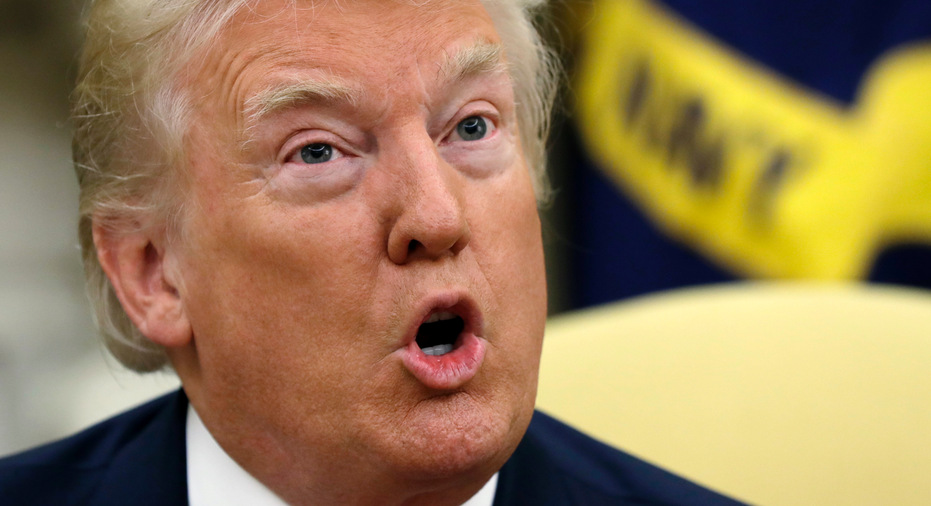Stocks are at records, but it's no longer the 'Trump trade'

NEW YORK – The stock market has never been higher, and President Donald Trump would like more people to pay attention.
"Stock Market could hit all-time high (again) 22,000 today," Trump tweeted Tuesday about the Dow Jones industrial average, before it ended the day at a record 21,963.92. "Was 18,000 only 6 months ago on Election Day. Mainstream media seldom mentions!"
The 18,000 figure he cited was inaccurate: The Dow closed at 19,890.94 six months ago. It was at 18,332.74 on Election Day, which was nearly nine months ago. And analysts say it would be inaccurate to give Trump full credit for the market's recent records.
"Trump obviously is taking credit for a lot of this, as almost any president would do, but the things that affect the market right now aren't things that have been put in place over the last six months," said Randy Frederick, vice president of trading and derivatives at the Schwab Center for Financial Research.
Stocks did surge after Trump's electoral win in November following a couple of hours of confusion among investors caught off-guard by the voting results. The hope was that Trump and a Republican-controlled Congress would cut regulations, revamp the tax system, launch a big program for infrastructure and enact other pro-business policies.
Areas of the market that would benefit most from such policies soared much more than the rest of the market, and the effect was so strong that traders called it the "Trump trade."
Smaller companies, for example, were supposed to be big winners if U.S. tax rates dropped because they tend to do more of their business domestically, and they do not have the armies of accountants that big multinational corporations use to lower their tax bills.
As a result, the Russell 2000 index of smaller stocks surged 16 percent in the month after the election. The index includes such companies as Pier 1 Imports and Big Lots. Its gain was more than triple the 5 percent rise for the biggest stocks in the Standard & Poor's 500 index.
In recent months, though, Washington has had several high-profile stumbles, highlighted by the Senate's latest failed attempt to repeal the Affordable Care Act. That inaction has investors pushing back their expectations for when a tax plan and other policy changes could happen, and some are questioning how big those changes can be given Republicans' struggles. So the Trump trade has not only faded but reversed course, with the initial leaders and laggards flipping places.
So far this year, the small-cap Russell 2000 has had less than half the gain of the S&P 500 index, at 5 percent versus 11 percent. Producers of raw materials, which were early winners on expectations that they would benefit from a big infrastructure program, are no longer leading the market. The effect goes beyond stocks: Big rallies for yields on Treasury bonds and the dollar's value against other currencies have also faded.
So what's keeping stocks at record heights? A return to strong profit growth for U.S. companies is one of the biggest reasons, analysts say. And some of the strongest growth is coming from companies that do business all over the world. Those businesses also happen to be the ones initially thought to be the biggest losers of Trump's "America-first" policy goals.
Tech stocks in the S&P 500 get more than half their sales from outside the country, for example, and they are benefiting as economies in Europe and across the developing world finally start to climb higher. The tech sector has jumped 22 percent this year to lead the market.
Easing worries about protectionism also mean stocks from China and other emerging markets have been big winners. The MSCI Emerging Markets stock index has more than doubled the S&P 500's gain this year.
Even the Mexican peso, which was so battered by Trump's call to "build the wall" through the campaign, has recovered all its losses since the election.
Touting the market's heights is a turnaround for Trump himself. He warned during last year's campaign that stock prices may have climbed too high. At a presidential debate in September, for example, Trump talked about the dangers he saw as the Federal Reserve prepared to raise interest rates.
"We're in a bubble right now," he said. "And the only thing that looks good is the stock market, but if you raise interest rates even a little bit, that's going to come crashing down."
Since that comment, the Federal Reserve has raised interest rates modestly three times.
The stock market was also setting records under Trump's predecessor. The Dow Jones industrial average surged nearly 150 percent over Barack Obama's eight-year presidency. Trump has been in office for a little more than half a year, and the Dow has climbed 11 percent since his January inauguration.
Even if the Trump trade has faded, some effects have been longer lasting. For example, optimism among small businesses is still much higher than it was before the election, even though it's moderated a bit in recent months.
If Trump were to serve two terms and stocks performed similarly under his administration as they did during the Obama years, the Dow would surpass 49,000 — something really worth tweeting about.



















